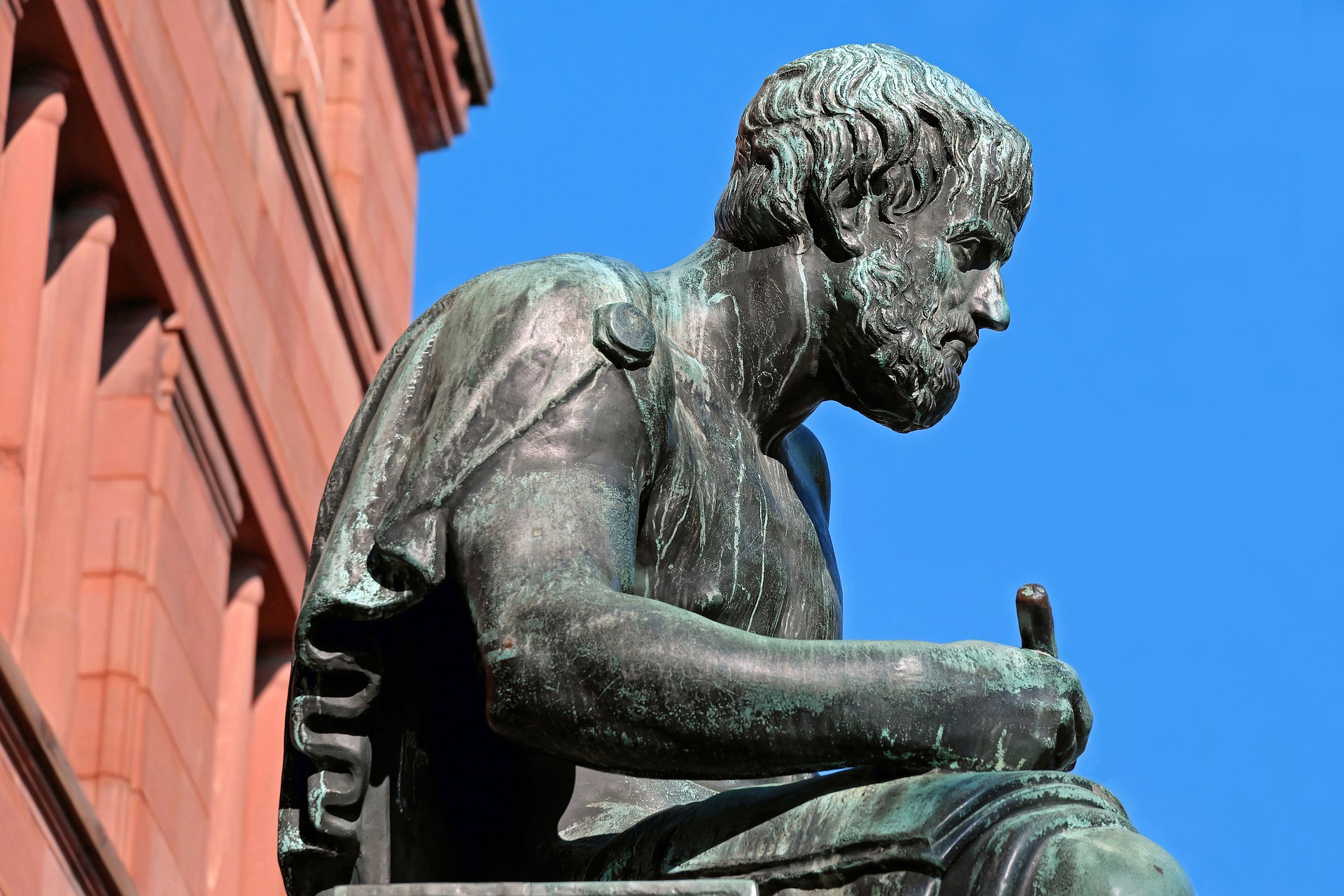John Stuart Mill’s name is associated inextricably with personal liberty, ethics, and practical philosophy. His most famous texts include On Liberty, and Utilitarianism, the latter of which we will discuss here. This essay was originally published in 1861 in Fraser’s Magazine, then bound as a book in 1863. In it, Mill builds upon the utilitarianism theory of Jeremy Bentham and the Kantian concept of duty. Mill accepts Bentham’s argument that happiness is the chief aim of people. However, in a departure from Bentham’s measuring of the quantity of pleasures, Mill argues that it is the quality of pleasures which should guide our actions. The foundation for Mill’s Utilitarianism is, firstly, Bentham’s Greatest Happiness principle,
‘Actions are right in proportion as they tend to promote happiness, wrong as they tend to produce the reverse of happiness.’
And secondly, Kant’s Fundamental Law of Pure Practical Reason (discussed here),
“Act so that the maxim of your will can always at the same time hold good as a principle of universal legislation.”
For this essay, we’ll begin with an outline of the text, followed by a summary; then address three main issues Mill raises which are central to his theory, compromise, the notion of greater and lesser pleasures, and the differences between justice and morality. Finally, I’ll conclude with my thoughts on just how fitting Mill’s framework for society remains.

Overview of “Utilitarianism”
The first chapter of Utilitarianism serves as an introduction to approaching ethics from a practical standpoint. Mill begins by establishing that a discussion of ethics must start with a general theory, then progress into addressing particular situations, as opposed to the reverse. Chapter two represents the bulk of the theory. It begins with the greatest happiness principle, then defines utilitarianism and lays out its objectives. Here Mill addresses common objections to both the theory and the term itself, while detailing the utilitarian perspective on the good of the many, sacrifice, duty, and morality. It is also in this chapter that Mill determines the best judge between two pleasures is the person who has experienced both of them.
The third chapter addresses the source of moral duty within utilitarianism, which he describes as “the conscientious feelings of mankind.” He describes these feelings as the internal standard of morality for most, while the physical consequences of external obligations and punishments represent the standard for those few who don’t possess said conscientious feelings. The next chapter establishes happiness as the chief aim of individuals, and posits health, virtue, the arts, etc, all as means to that ultimate end. The final chapter connects justice with utility, continuing on to define both justice and morality, and separating them from generosity.
Summary of text:
Where individual rights to happiness end and society’s responsibility to preserve the happiness of the many begin?
It’s the fundamental question of ethical government, and the question Mill endeavors to answer. His conclusion that certain pleasures and rights are valued more highly than others, is right. We do fundamentally place higher value on concrete needs like food, water and security, than on the abstract needs of personal fulfillment, and self-actualization. In calling attention to this fact, we have a starting outline for what society should be most concerned with. Then, as the needs become less fundamental, we continue to weigh them against the needs of society, with those with experience being designated as the best to judge. In keeping with his principle of starting with general and progressing to particular, this practical approach to ethics can be thought of as a process to employ to determine the morality of a given act, rather than simply a strict code of conduct. The result is a concise, functional framework for society, and government, to determine the rights and desires of the few or individual against the needs and desires of the many.

Compromise:
In the opening paragraphs, Mill states,
“All action is for the sake of some end, and rules of action, it seems natural to suppose, must take their whole character and color from the end to which they are subservient.”
For Mill, the action’s purpose determines whether or not the action is moral or appropriate.
Next, he observes that everything mankind does is in the pursuit of happiness:
“The utilitarian doctrine is, that happiness is desirable, and the only thing desirable, as an end…”
However, there will be times where individual happiness must be abandoned or subverted to the greater happiness of all involved. It’s easy to see how the unmitigated pursuit of happiness could go awry quickly, should one focus solely on personal happiness rather than maximizing happiness for the most people.
“[T]he happiness which forms the utilitarian standard of what is right in conduct, is not the agent’s own happiness, but that of all concerned.”
It’s not enough to simply act on what would make you or a few people happy, but what would allow for the greatest happiness of the community or society.
If one were to summarize Mill’s essay in another word, I think the term “compromise” would be appropriate. Society is composed of millions of individuals, each with an innate right to pursue happiness. Inevitably, disagreements will arise as to whose rights and happiness should take precedence. Mill asks us to consider everyone, not just our own desires. He quotes the wise Immanuel Kant, “Act so that the maxim of your will can always at the same time hold good as a principle of universal legislation.” By weighing our individual desires against the happiness of society, the gradual effect is the heightening of our desires and sensibilities as a society. By subverting our own desires in the moment, and preserving rights, happiness, dignity for everyone in the process, we all reap the benefits. When we choose to forgo our own pleasure in order to bring about and preserve the greater, common good, we all succeed.
We will at times need to sacrifice our own needs to ensure the more vital needs of others are met, as is the nature of living in society.
The heart of Mill’s conception of ethics is individual liberty, driving our modern notions of rights, dignity, and societal responsibility. We should use our liberty not only to secure happiness for ourselves, but continue to develop ourselves and our community by securing rights and happiness for others.

Higher Pleasures
As Abraham Maslow would describe less than a century later, there exists a hierarchy of needs. With the lower levels comprising our most basic needs, to be met first, the realization of self-fulfillment comes as we continue toward the higher needs. This difference in quality of pleasure represents the key to the success of Mill’s argument. When the needs of society line up with and address the needs of the individual, progress can begin to take shape.
Mill states a similar premise in regards to society’s role in addressing needs,
“It is quite compatible with the principle of utility to recognize the fact, that some kinds of pleasure are more desirable and more valuable than others.”
Then,
“It is better to be a human being dissatisfied than a pig satisfied; better to be Socrates dissatisfied than a fool satisfied.”
It also falls to us to cultivate and stir up within our selves an appetite for higher things, not being satisfied with low pleasures, as implied here.
Society across the globe has been improving with each generation since the Enlightenment. At the very least, we are eradicating diseases, bringing sustainable food, water, and shelter to more people, raising life expectancy and birth rates the world over. We still have work to do, but life is safer, more secure, longer and healthier than it was even fifty years ago. Eventually, basic needs like access to food, water, shelter, and health care will be standard for the world’s general population, as is already a reality in many countries.
As more of humanity’s basic needs are met, we must remember to collectively pursue the higher needs as articulated by Maslow. We can not be satisfied simply because our bellies are full; instead, we should push forward to personal and professional achievements, engaging with our communities, and ultimately, realizing our full potential.
“Men lose their high aspirations as they lose their intellectual tastes, because they have not time or opportunity for indulging them.”
While Mill may be making an exception for 19th century day laborers who worked and consequentially didn’t have time to indulge their intellectual interests, I believe our modern lives afford us all more time and opportunity for such pursuits. Having our basic needs met, we must develop our minds to not be satisfied with foolish arguments or poor quality of thought. To that end, the content of our thoughts depends on the quality of content we consume.
We have limitless access to more information than at any point in human history. We all walk around with supercomputers in our pockets and can access nearly any sort of wisdom, information, or entertainment on a whim. We all have the opportunity to indulge and cultivate our intellect. Critically however, most Americans spend three hours each day watching television, and even more on social media.
We do have the time and access. It’s simply a matter of habit.
As we make the choice to pursue higher aspirations and pleasures, they often take the form of giving back to others in some way. This is what Mill, Maslow, and Adam Smith are all referring to when they speak about individual freedom creating a better life for everyone in the community. A critical part of achieving personal fulfillment is giving back to others who are less fortunate, as our individual successes are intertwined with the success of the entire community. As this give and take occurs, it results in the raising of everyone’s standard of living, as we’ve seen.

Justice and Morality
In the final chapter, having dealt with happiness and pleasures, Mill turns to determining how we determine and enforce justice. As he observes, the concepts of justice and morality can seem to blend together when we speak about ethics, but they do differ from each other, mirroring his concept of lesser and higher pleasures. Mill explains:
“Justice implies something which it is not only right to do, and wrong not to do, but which some individual person can claim from us as his moral right….Wherever there is a right, the case is one of justice, and not of the virtue of beneficence…”
“Justice is the name for certain classes of moral rules, which concern the essentials of human well-being more nearly, and are therefore of more absolute obligation, than any other rules for the guidance of life; and the notion which we have found to be of the essence of the idea of justice, that of a right residing in an individual, implies and testifies to this more binding obligation.”
Justice, then, does sometimes overlap with morals, to give expediency to certain rights and securities over others.
“[T]he natural feeling would make us resent indiscriminately whatever any one does that is disagreeable to us; but when moralized by the social feeling, it only acts in the directions conformable to the general good: just persons resenting a hurt to society, though not otherwise a hurt to themselves, and not resenting a hurt to themselves, however painful, unless it be of the kind which society has a common interest with them in the repression of.”
Where morals are primarily concerned with individuals, and particular circumstances, society’s ethics need to be built generally. For this purpose, the most egregious moral violations are also seen as harms to society. Mill details the intricacies of returning good for good, and evil for evil; both being vital in a system of justice, and both necessary to maintain a society’s ability to protect its own citizens.
He concludes the entire text with,
“Justice remains the appropriate name for certain social utilities which are vastly more important, and therefore more absolute and imperative, than any others are as a class; and which, therefore ought to be, as well as naturally are guarded by a sentiment not only different in degree, but also in kind; distinguished from the milder feeling which attaches to the mere idea of promoting human pleasure or convenience, at once by the more definite nature of its commands, and by the sterner character of its sanctions. “

Justice, then, is the sterner, more explicit enforcement of morality within the context of society. As Mill allows, morality and ethics may change as society’s tastes, enlightenment, and needs change. We’ve seen these hurts to society addressed and altered as we’ve moved throughout history. From the founding of the United States (religious freedom) to the Civil War (slavery and individual rights) to the Civil Rights era (segregation, womens’ rights, etc), society has recognized that certain past customs or patterns can no longer be justified.
Conclusion
A society which values individual rights in balance with the happiness of the community is a society which will enable itself to grow, advance, and flourish. Generosity by definition can not be mandated. Similarly, the personal initiative found in pursuing self-fulfillment, and the benefits provided to society in that pursuit, should remind each of us that society can only flourish when her individuals flourish. As basic needs and rights are secured, the trend toward self-fulfillment should be encouraged, not begrudged. We should encourage people to learn more, create more businesses, undertake more creative endeavors, and discover innovation. The society which encourages her citizens do so is the one which will prosper.
Ed. note: This is the twenty-third entry in a series looking at the three schools of philosophy for perspectives on navigating our modern world. Inspired by Emerson’s “The American Scholar,” we are exploring timeless wisdom which endures to inform our approaches to learning, relationships and leadership.Click here for all the posts in this series.




